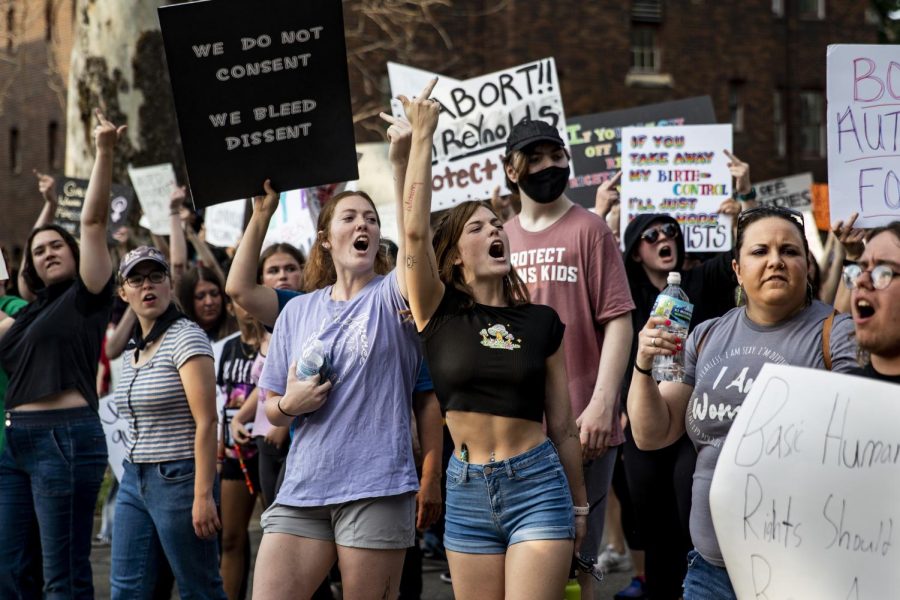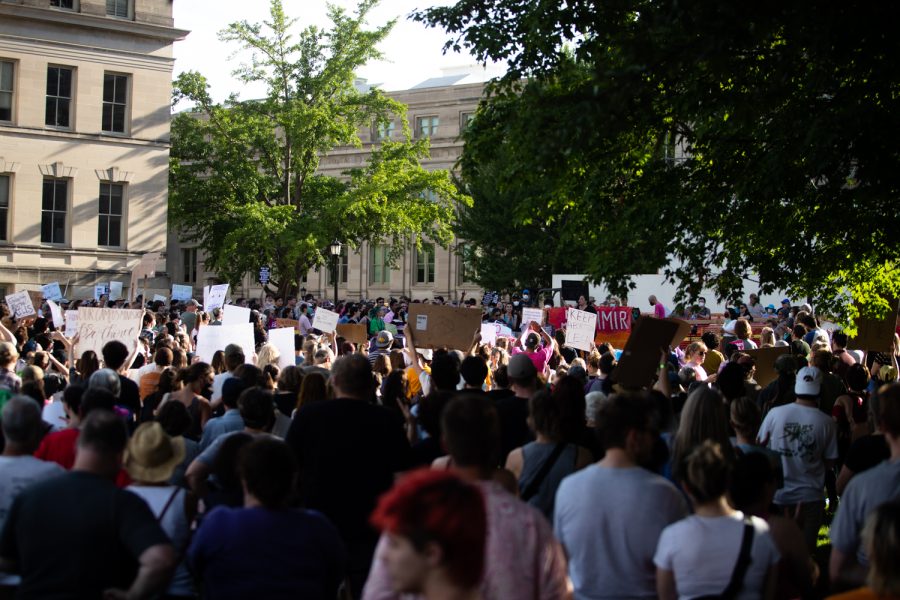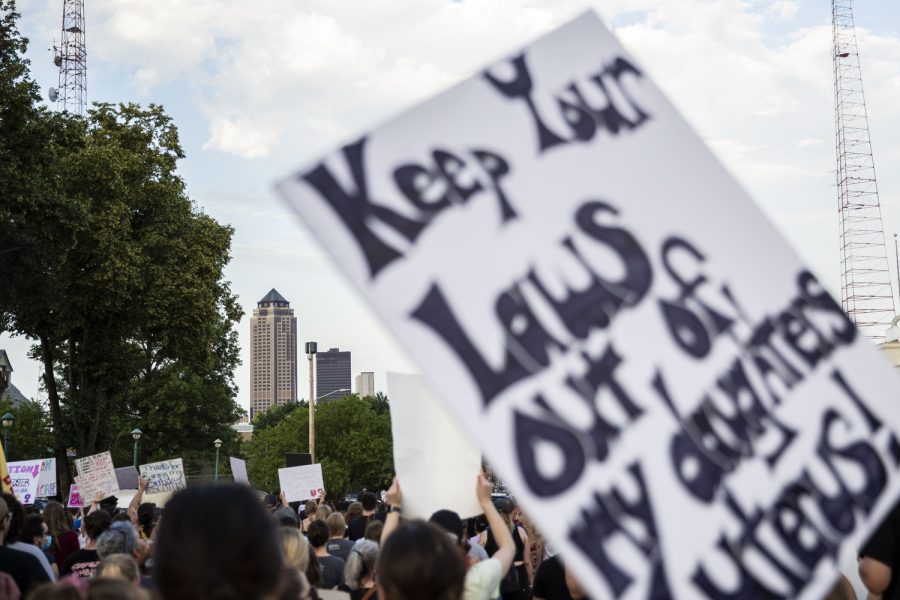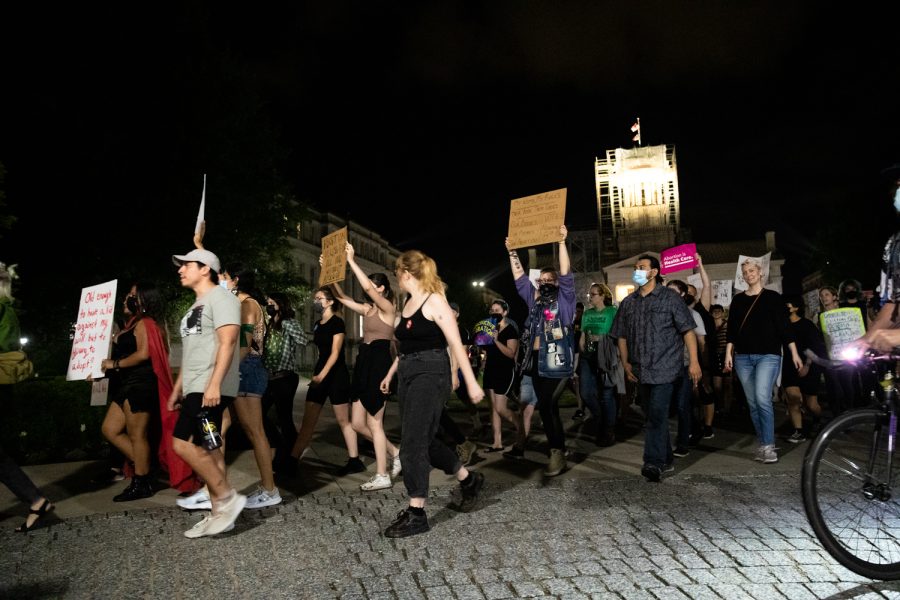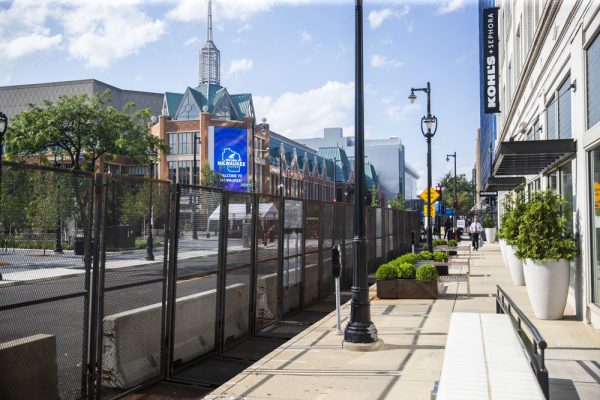Protests for abortion rights, a weekend recap
Following the overturning of Roe v. Wade by the United States Supreme Court on June 24, Iowans took the streets this weekend to march for abortion rights.
Protesters yell toward Iowa Gov. Kim Reynold’s mansion during an abortion-rights protest in Des Moines, Iowa, following the U.S. Supreme Court’s decision to overturn Roe V. Wade on Friday, June 24, 2022. Thousands of protesters marched from Central Academy’s campus to Gov. Reynolds’ mansion on Terrace Hill.
June 26, 2022
After the U.S. Supreme Court overturned Roe v. Wade, Iowa City and Des Moines demonstrators took to the streets throughout the weekend.
On Friday night, demonstrators arrived at the Pentacrest. Organized by local abortion access activist, Mica Dolan, speakers from the Emma Goldman Clinic, Planned Parenthood, and other protesters expressed feelings about the ruling.
Francine Thompson, the executive director of the Emma Goldman Clinic, said at the protest on Friday that protesters should take their anger and vote for pro-choice candidates in the upcoming November elections.
“We have a long, hard fight ahead of us,” Thompson said. “The real impact of these bans are devastating. People are forced to either leave their communities to seek care, [or] are forced to remain pregnant and give birth.”
After the speakers, the protesters marched through the streets, with organizers scouting ahead to direct cars away from the marching route. No injuries were reported in connection to the protest.
Meanwhile, in Des Moines, around 2,000 protesters marched from Central Academy to Gov. Kim Reynolds’ house. The protesters put signs on her fence while chanting “My body, my choice” and “F*** Kim Reynolds.”
Jalesha Johnson, leader of the protest, said now that Roe v. Wade has been overturned, she doesn’t feel much different from how she has throughout her adult life.
“I feel hopeful, I feel angry, I feel upset,” Johnson said. “But I also feel motivated to continue to make a movement, to make my city safer for all of the people that inhabit it.”
RELATED: Abortion-rights protest in Des Moines following overturn of Roe v. Wade
Johnson, 23, said she’s been organizing protests since she was 16. In order for the political climate in Iowa to change, she said, it’s going to take a lot of people showing that they’re fed up in a lot of different ways.
“I think it’s going to take folks using all of their excess energy and pushing the people that are in power — making them feel pressured to do something to make this world safer.”
Ryan Maher, a protester holding an upside-down U.S. flag, symbolizing that the nation is in distress, said he worries that the Supreme Court isn’t going to stop at abortion.
“[Justice] Clarence Thomas even said they want to go after marriage equality, contraception — ironically, everything but interracial marriage. I wonder why,” Maher said with sarcasm, referencing the fact that Thomas is in an interracial marriage.
Deann Dalrymple, a demonstrator who attended protests in favor of abortion rights before the 1973 Roe v. Wade case, said she can’t believe she’s having to do this all over again.
“If they can overturn this, they can do whatever they want. It’s just another right that’s been taken away,” Dalrymple said.
On Saturday in Iowa City, protesters gathered again at the Pentacrest for the “Night of Rage.” Protesters voiced their anger for about an hour before marching to Informed Choices, a clinic protest organizers say is anti-choice, and spray painted the clinic’s sign.
Freya Baum, a “Night of Rage” protester who uses they/them pronouns, said that they have a condition known as Ehlers Danlos hypermobility disorder, which is a genetic disorder that affects joints, making it painful to move. The National Center for Advancing Translational Sciences estimates that anywhere from 30,000 to 200,000 Americans have this condition.
Baum said if they were to become pregnant and give birth, they could potentially die.
In Iowa, abortion is granted after 21 weeks if the life of the pregnant person is at risk, or if their physical health could be severely impacted, but Baum does not trust that the Iowa government would grant people an abortion with their condition.
“Once they get an inch, they’ll take a mile,” Baum said. “They’re gonna force a lot of people like me to die on those tables — to die during their pregnancy and leave a child without anything, to get forced into foster care.”
More protests are slated to happen as the month goes on.



